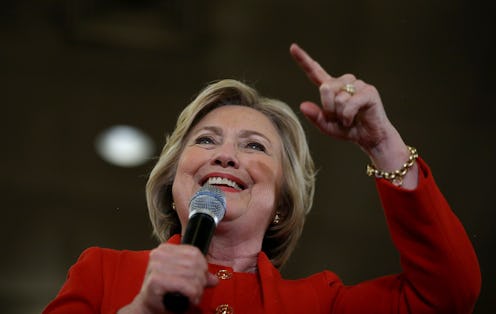News
New York Superdelegates Have A Loud Voice
The highly anticipated New York primary is almost here, taking place on Tuesday, April 19 for both parties. New York's Republican primary has 95 delegates at stake, and frontrunner Donald Trump is ahead in the polls leading up to the state, followed by Ohio Gov. John Kasich. On the Democratic side, New York has been a battle ground for Brooklyn-born Vermont Sen. Bernie Sanders and former New York Sen. Hillary Clinton, who both have tight claims to the state. While the fate of the Democratic race has largely been determined by superdelegates throughout this primary cycle, does New York have superdelegates? And how will they affect the state's outcome?
There are a total of 291 delegates at stake for the Democratic party in New York. Of those 291, 163 are pledged and allocated on a proportional basis, 84 are at-large, but are also pledged and allocated based on the statewide primary vote. The remaining 44 delegates are superdelegates, and include DNC members, U.S. House Representatives, Senators, and Party Leaders. Some notable New York superdelegates include former President Bill Clinton, Gov. Andrew Cuomo, and U.S. Representative Louise Slaughter — they have all pledged their support for Hillary Clinton. Leading into New York's Democratic primary, the latest polls has Clinton ahead of Sanders by 13.3 points, with 52.6 percent to his 39.3 percent.
The last few weeks have shed light on the importance and weight of these superdelegates in the Democratic primary. Sanders has trailed Clinton throughout the primaries with a couple hundred pledged delegates, but the numbers that really create the big margin between the two candidates come from the superdelegate votes. There are 2,383 delegates needed to secure the Democratic nomination, and Clinton currently holds 1,758 compared to Sanders' 1,069. But that includes both pledged delegates and superdelegates. A breakdown of the numbers without the superdelegate votes portrays a different narrative: Sanders is only down by 251 in pledged delegates.
Perhaps the best example of this system are the results of the Wyoming caucus, where Sanders won by 12 percent, but took only 7 of the 18 available delegates. A segment of Morning Joe with MSNBC host Joe Scarborough made a point of questioning whether voting in this election even mattered. Scarborough asked, "Bernie Sanders wins 56 to 44 percent in Wyoming. The delegates rewarded Hillary Clinton 11, Bernie Sanders 7. Why does the Democratic Party even have voting booths? This system is so rigged."
The current system as it is has given greater agency and a louder voice to the Democratic establishment than to the people going out to the polls and casting their votes. While superdelegates can certainly change their vote at the Democratic National Convention in July, the fact that they are disproportionately siding with Clinton — even when Sanders wins big — has been disheartening to voters around the country.
New York's superdelegates will certainly be important to Tuesday's primary. We'll have to wait and see how they affiliate themselves; however, as has been clear in previous states this cycle, it seems that even New York's superdelegates are largely backing Clinton.
